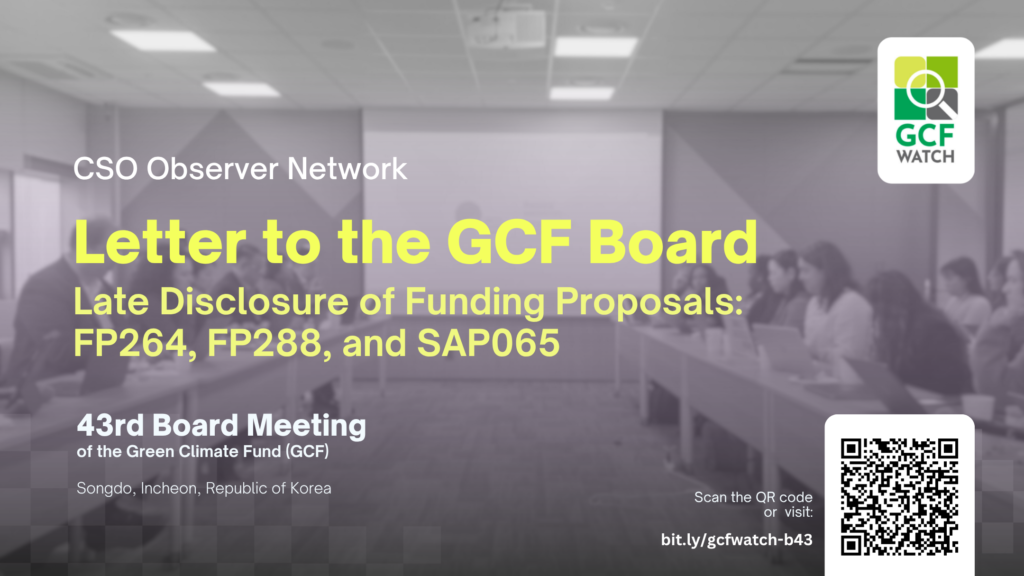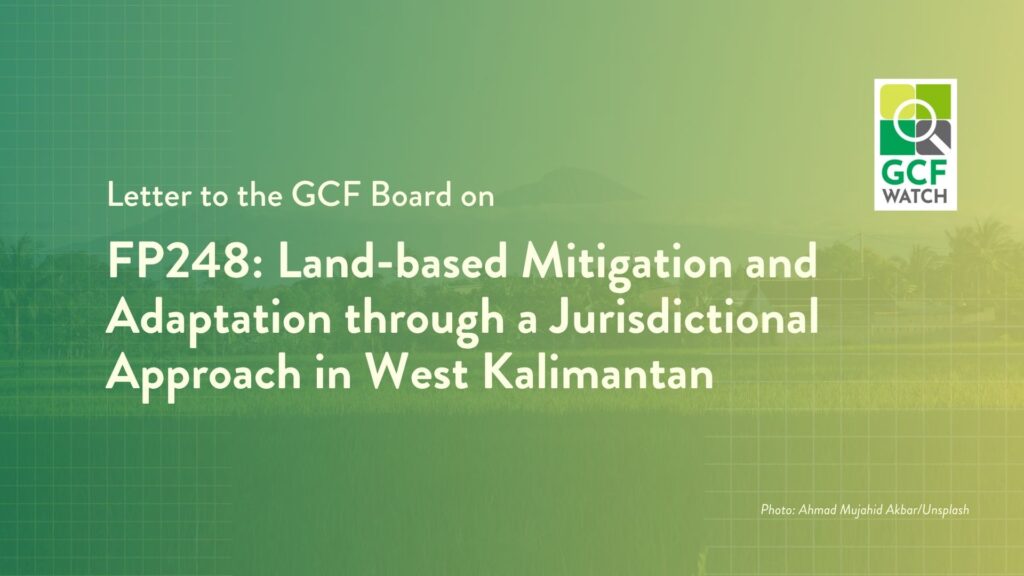Letter to the Board on SAP054: SOURCE Pacific Drinking Water Project
Dear Board members, alternates, and advisors,
We have serious concerns about the SAP054 – SOURCE Pacific Drinking Water Project project being presented at B.42, due to the design of the project itself, as well as the use of the Simplified Approval Process, which was intended with the enhancement of direct access in mind, and is instead being transformed into yet another mechanism to push for a private sector-led agenda within the GCF.
The rationale for this project is to test and potentially “unlock” the viability of new technologies developed in rich countries, in stark contrast to what should be the aim of every adaptation project before the GCF: using scarce public climate adaptation finance to directly benefit communities in the most vulnerable countries. It is yet another example of a broader trend within the GCF to pursue approaches that succumb to an existing market logic and status quo, instead of using GCF funding to promote a transformation of markets and the private sector to serve climate goals and provide direct benefits.
According to the AE’s response to questions raised, the GCF is being asked to co-invest in the largest private-sector, off-grid drinking water program ever attempted in the Pacific. We are asking the GCF to consider the risks of such an investment against its core responsibility to support vulnerable communities to adapt.
We strongly agree with the ITAP’s assessment that almost all risks related to both the untested technology being proposed here, its viability and sustainability, as well as risks related to fluctuations in currency exchange rates, are being pushed onto the countries themselves. These substantial risks are likely being transferred to vulnerable communities, in order to protect the interests and profits of the private company providing the technology.
If this largely untested technology underperforms or is not fully adopted by the final beneficiaries, due to many of the barriers identified by the proposal, but never fully addressed in the design, including cultural and social preferences, it is the vulnerable countries that will be saddled with unproductive fee payments for 20 years. The AE’s assertion that end users will not pay the price because individual students and community members are not being charged, only public utilities and ministries such as ministries of education, feels disconnected from a reality where we know the eroding of public service budgets obviously impacts the users of those services.
At a time when public utilities and ministries of education are often under-funded due to debt service payments, creating a scheme to extract funding from them to line the pockets of a private company and the loan-holders ADB and GCF is antithetical to the creation of resilient communities. The needs of the beneficiaries are not being served by the attempt to mine private profit from the needs of schools and the children they are educating.
Our concerns are compounded by a complete lack of transparency around key aspects of this proposal. The public is not allowed access to the per panel annual fee that will be charged to the government agencies acting as offtakers, and ultimately to taxpayers. How this fee was or will be calculated, its affordability, and its competitiveness over time (given the lock-in period), are all deemed confidential, not available to the public. What will be the impacts on these agencies’ budgets? We also know very little about potential alternatives, including cost comparisons. Finally, we know nothing about how this technology has performed in other areas where it has been deployed before.
If there is a real market and demand for decentralised water security systems, this technology should be made to compete with other such technologies and approaches, instead of the GCF using scarce public funding to promote any specific technology over others, with little or no public explanation about why this particularly technology and company were chosen over others.
We strongly urge the Board not to approve SAP054, not only because of the risks it places on vulnerable countries and communities, but because of the misguided message it sends about the GCF’s role and understanding of how to drive a true paradigm shift in climate finance.
Yours,
The GCF observer network of civil society, Indigenous Peoples, and local communities
DOWNLOAD PDF COPY
***
NOTE: The observer network circulated this letter to Board members, alternates, and their advisors prior to the 42nd Board Meeting of the Green Climate Fund (B.42). An intervention has also been delivered during the consideration of Funding Proposals at B.42.








